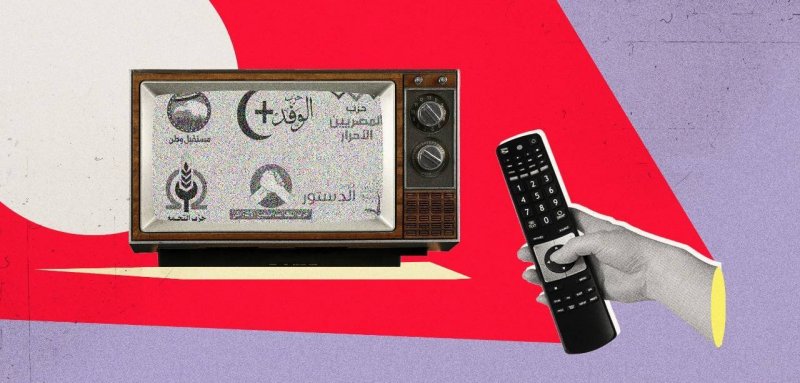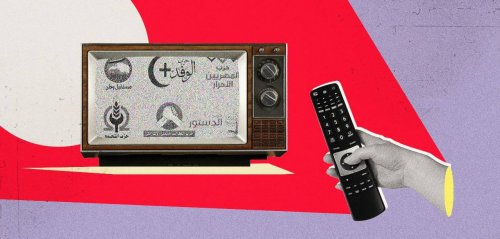The majority of Egypt’s political parties now look like a clinically dead patient. All evidence points to their failure to play a role, even if it was just political “make-up” meant for the “face” of the authority. Many parties are moving and giving their support through a “remote control” held by the sovereign bodies that have brought most of the parties into the “house of political obedience” whether forcibly or voluntarily.
Even though the regime of former President Mubarak used to deal with opposition parties as a “security issue” — even if they were merely practicing a cardboard-like opposition — this “entire” file is now being dealt with as a matter of security, whether those entities are “pro-government” or “opposing”, in an attempt to keep all parties “under control”.
The attention of observers of Egyptian political affairs is drawn to “major political parties” — that are described as “loyal” or pro-government — that are avoiding to express their opinion on important issues facing Egypt and Egyptians, especially the issue of the “Grand Renaissance Dam”.
Among the political parties accused of this “unacceptable silence” are the “Wafd Party”, a liberal party now headed by lawyer Bahaa el-Din Abou Shaka with representation in both the Senate and the House of Representatives; and the “Nation’s Future Party” (also known as the Mostaqbal Watan party) headed by the former president of the Supreme Constitutional Court, Counselor Abdel Wahab Abdel Razek. Among the most prominent members of the Mostaqbal Watan party is its Secretary-General, First Deputy Chairman, and majority leader in the House of Representatives Ashraf Rashad.
Also on the list is the Republican People’s Party, which adopts social liberal ideas and is headed by Hazem Omar — among its most prominent members is the famous Egyptian MP and businessman Ahmed Abou Hashima; the Conference Party (or Congress Party), founded by the former Secretary-General of the League of Arab States Amr Moussa and now headed by Captain Omar al-Mukhtar Samida; and the Egyptian Patriotic Movement (or Egyptian National Movement) which was founded by former presidential candidate Lieutenant-General Ahmed Shafiq in January 2013 and is now headed by Major General Raouf al-Sayyid.
Where are the roles and standpoints of these major “loyalist” parties that are supported by the authority? They cannot be found. Where are the opinions of its leaders and members? They cannot be found. Most of their views and positions on all issues now come with a complete “blank check” in support of the authority.
In line with how they deal with an issue such as the “Grand Renaissance Dam”, the positions of the majority of these parties continue to provide blind support to the decisions of the country’s political authority, whether they be related to the “Covid crisis”, foreign affairs of concern, economic crises, or even major incidents that may sometimes come up such as this year’s deadly train crashes.
Voices Outside of Context
There are a few parties that are keen to ‘tweet outside the flock’ and are trying to escape the iron fist that stifles political action in the region. The most notable ones include the “Dignity Party”, a Nasserist faction founded by politician and former presidential candidate Hamdeen Sabahi and is now headed by prominent opposition figure Ahmed Tantawi; the “Egyptian Social Democratic Party”, a party founded in 2011 that adopts a social liberal ideology and is headed by Farid Zahran; in addition to the “Socialist Popular Alliance Party”, a left-leaning group that was established after the January 25 revolution, headed by Medhat al-Zahed, and includes among its most famous members former MP Haitham el-Hariri; as well as the “Constitution Party”, which was founded by Nobel Peace Prize laureate Dr. Mohammad el-Barade in 2012 and is now headed by Alaa el-Khayam; and finally, the “Bread and Freedom Party” (also known as the Bread and Liberty Party), which is still under construction.
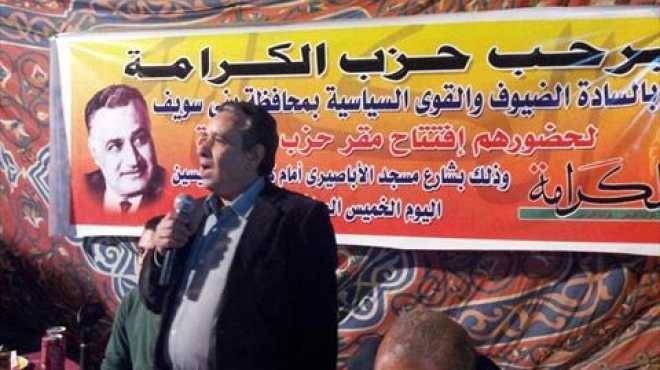
Of these parties is the “Egyptian Social Democratic Party”. Despite its participation in the electoral lists that were “engineered” by sovereign bodies last year, it had several different positions that go beyond the “ceiling” under which the majority of parties operate, acting in an “unruly” and “disobedient” manner with the authority.
The previous dialogue is confirmed by the party’s hardline stance towards two important incidents: It first demanded in a statement the dismissal of Foreign Minister Sameh Shoukry, and to also hold him accountable for violating the stance of the Egyptian administration regarding the second filling of the Grand Renaissance Dam, noting that the Ethiopian Foreign Ministry took advantage of his statements and used them to market to the world that Egypt considers that this step will not affect its water requirements.
In the second incident, party member and MP Freddy Elbaiady debated Minister Sameh Shoukry on the statement issued by 31 countries expressing their concern before the United Nations Human Rights Council regarding the violation of freedoms in Egypt. In his speech to Shoukry, Elbaiady said, “Denying the existence of problems in the human rights file and denying the existence of freedom restrictions is like burying our heads in the sand.” He then called on the Egyptian government to provide a detailed response to what Egypt has accomplished in the human rights file and to identify existing problems and what the state’s plan to fix them is.
For its part, the “Dignity Party” stands out as a voice that regularly criticizes and questions authority. In addition to the seminars he organizes on pre-trial detention, the deteriorating conditions of prisoners, the methods to provide them with solidarity and legal support, as well as his condemnation of the series of liquidation cases in companies and factories, Ahmed Tantawi presented his view on the issue of the Grand Renaissance Dam, noting that it is the greater danger currently threatening the Egyptian state. He pointed out that his vision for a solution is focused on “negotiating, cooperating, engaging the international community to assume its responsibilities, the legitimate use of force within the framework of international law and bilateral and collective treaties for the Nile Basin countries, offering a package of economic incentives and sharing common benefits in water and other economic aspects between Egypt and Ethiopia, and to involve the international community in assuming its responsibilities in maintaining peace and security.” He went on to stress that “pushing the region into a state of tension is not in anyone’s interests, and Egypt has an option that it can resort to by submitting a complaint to the UN Security Council, as it is responsible for maintaining international peace and security under article 7 that allows for the use of force.”
Where is the role of these major “loyalist” parties so liked by Egypt’s regime? Where are the opinions of its leaders and members? Most of their views and positions on all issues now come with a “blank check” in support of the authority.
However, despite the presence of the famous political opposition figure and former member of Egyptian Parliament Ahmed Tantawi at the head of the “Dignity party”, this has not contributed — at least thus far — to the inauguration of a new path for this party, or achieving a breakthrough in terms of its presence publicly on the Egyptian streets. This comes at a time when Tantawi is enjoying a great state of public approval on the streets. The majority of opposition leaders attribute this issue to the security restrictions and the media blackout on the party’s movements.
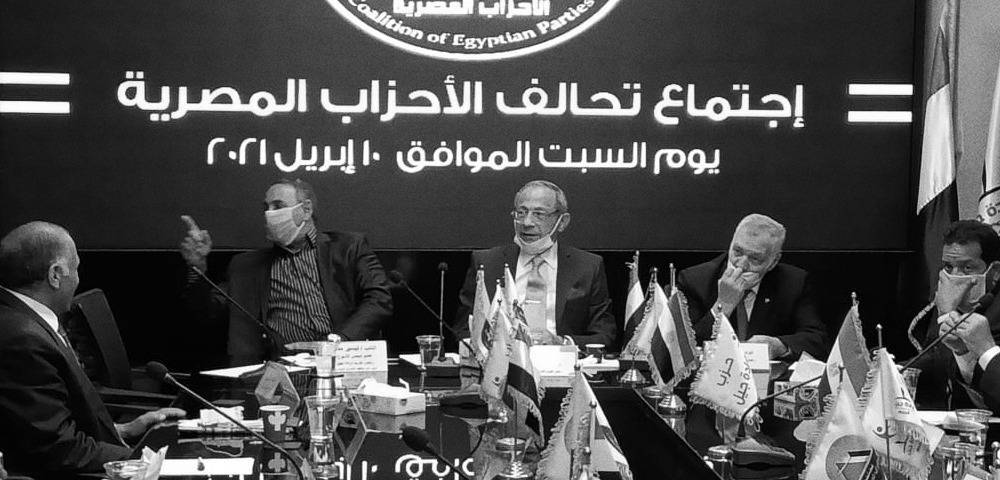
Calls for Merging the Parties
The state of weakness that the parties in Egypt — numbering at more than 104 — are suffering from, has caused a rise in calls to merge them at varying intervals of time, including what was put forward by journalist Yasser Rizk. The writer and former chairman of the board of directors of the “Akhbar El Yom Foundation” proposed conducting a comprehensive dialogue between the parties with the aim of “integrating those that have similar agendas and programmes, ideas, and political orientation to form political blocs that properly express the right, the left, and the center, and are also capable of sorting and selecting qualified members along with qualifying leading cadres to run for elections, starting from small localities all the way to the presidency.
Rizk, who is close to decision-making bodies, suggested that the “Wafd” and “Mostaqbal Watan” parties begin this dialogue, noting that there are no “strong parties with well-established public bases that are not artificial and are able to stand strong in the face of political temptations, lead the masses, and are not driven by irrational tendencies or temporary whims.”
Egyptian President Abdel Fattah al-Sisi had previously called for the merging of political parties, justifying his proposal with the great number of parties that are currently active and saying that merging them increases their capabilities.
In April 2018, al-Sisi spoke of the necessity of cooperation between the heads of political parties as well as conducting negotiations between them, so that a rapprochement of sorts occurs between these entities, whether it be through “merger” or a political alliance on various issues and in electoral battles.
At a time when most parties are “marginalized” — except for those that are approved of — and calls for merging are popping up, the “Coordination’s Committee of Party’s Youth Leaders and Politicians” [CPYP] is finding great interest and support from the authority: extensive media coverage in most media outlets, “polishing” and television interviews for its members, articles for them, and interviews in major state-owned newspapers.
This political entity has become the “royal gateway” to gain access to senior positions in the state, appointments to parliament and legislative councils, and even the media and the press: it has 31 seats in the House of Representatives, 12 seats in the Senate, and 6 members of the substantive committee in the Supreme Council for Media Regulation (Ministry of Information), in addition to appointing five members of the entity as deputy governors.
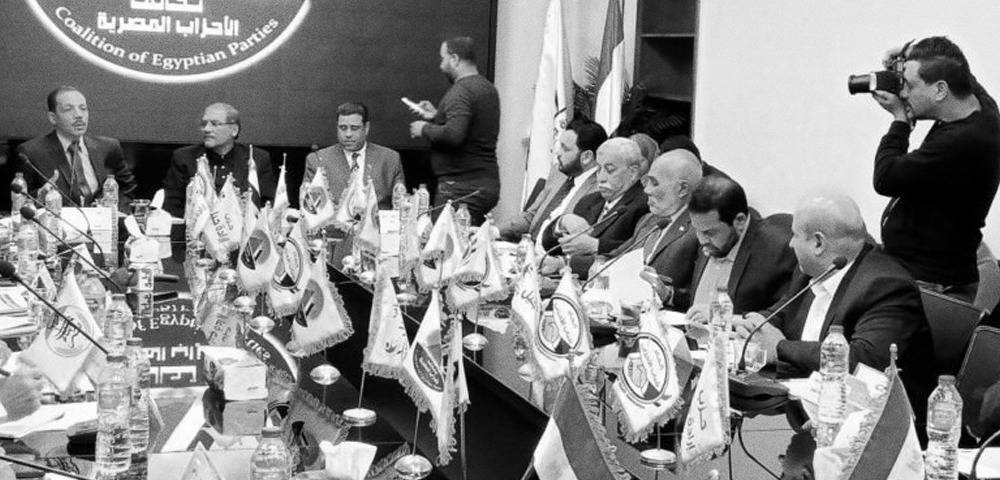
Desirable and Undesirable Issues
Major General Mohamed al-Ghobashy, assistant head of the Egyptian Homeland Protectors Party, considers that his party was birthed from the “June 30 Revolution”, with the aim of practicing politics in the interest of the security and stability of the country. He sees that there are two types of major political issues: issues which parties can actively participate in, and others where it’s not desirable for them to be involved in at all.
The “Homeland Protectors Party” is headed by Lieutenant-General Galal Haridy, one of the founders of the “Thunderbolt Forces” in the Egyptian armed special forces. When it was established, it was described as one of the “generals’ parties” that emerged in recent years and included a large number of retired soldiers and commanders of army brigades.
“The state is burying all parties… Even the Wafd Party has been left with nothing but its name… All parties are scrambling behind what the security apparatus see fit. These are entities that do not have independent opinions on any policies.”
This political entity was one of the parties that strongly supported the election of Sisi. It also mobilized its secretariats and headquarters within Egyptian governorates to support the recent amendments to the Egyptian constitution, which were approved in April 2019 with 88.33% of the popular vote, and included specific clauses, of which the most important was the extension of the presidential term for six years.
Al-Ghobashy tells Raseef22, “On the issue of the Grand Renaissance Dam, the participation of political parties is supposed to be with the endorsement and support only for the political positions taken by the leaders of the state, because there are a lot of data and information that only the decision-maker is aware of. Thus, if these parties voice an opinion on their own, it would be uninformed. This opinion may be correct from the party’s point of view, but it is wrong with regards to public opinion or the opinion of the state.”
The assistant head of the Homeland Protectors Party reveals that his party participated in facing the crisis caused by the Coronavirus outbreak by distributing medical supplies throughout all Egyptian governorates, and distributing financial aid to those affected, as well as participating in the aid convoy that have recently headed to the Gaza Strip. The assistant also notes that the party supports the state’s decision to rebuild Gaza.
He asserts, “The Homeland Protectors Party is the party that has participated the most in issues related to Egyptian national security: providing daily bread is national security, and providing medical services is national security, because national security is not only weapons and border protection.”
Regarding the calls that surface at certain intervals over merging some Egyptian political parties, al-Ghobashy supports such an approach. He says that this approach helps provide support to these entities by the state, instead of the current state of disarray, and instead of the presence of parties whose role is solely limited to issuing political statements. Their agendas are all one and the same, and they do not have headquarters or secretariats in any of the country’s governorates.
Al-Ghobashy explains the state of weakness that most Egyptian parties suffer from, clarifying that political party life before the January 25 revolution of 2011 was a pre-arranged stage play. The National Democratic Party used to control everything, and the opposition was merely formal within certain limits and participated under the guidance of the political leadership at the time. He goes on, “Before 2011, we lived with politics that were a charade and a farce. Even the National Democratic Party did not have within it a real approach to issues in a way that allowed the existence of an opinion and differing views. The party was completely managed by the decisions and opinions of one man.”
Al-Ghobashi sees that the period following the January revolution saw the formation of political parties that can be divided into three types: first, parties formed on a religious basis, one of which was dissolved after June 30th and another that needs to be dissolved; second, parties that sought assistance from the cadres of the dissolved National Party; the third type were parties dominated by businessmen.
“The State Buries Parties”
Dr. Amr Hashim Rabie, Deputy Director of Al-Ahram Center for Political and Strategic Studies (ACPSS) and an expert in parliamentary affairs, disagrees with al-Ghobashi’s explanations for the parties’ weakness and their absence from discussing major political issues. He asserts that the situation that the parties have reached is caused by several reasons, the most important of which is the continuation to impose emergency law, the electoral system that limits the presence of these political entities in Parliament, and the lack of self-financing for them, as well as the absence of democracy within those same parties.
Rabie does not agree with the justification of party leaders for not talking about major issues — such as the Grand Renaissance Dam — through the claim that they are issues of “national security”. He says to Raseef22, “This talk is total nonsense and has no value. The parties in Israel, for example, have nothing to talk about except the Jewish nation-state, the future of the Palestinians, and the land, but here we are in a state of complete political vacuum and paralysis about which two sides — the authority and the parties — are being asked.”
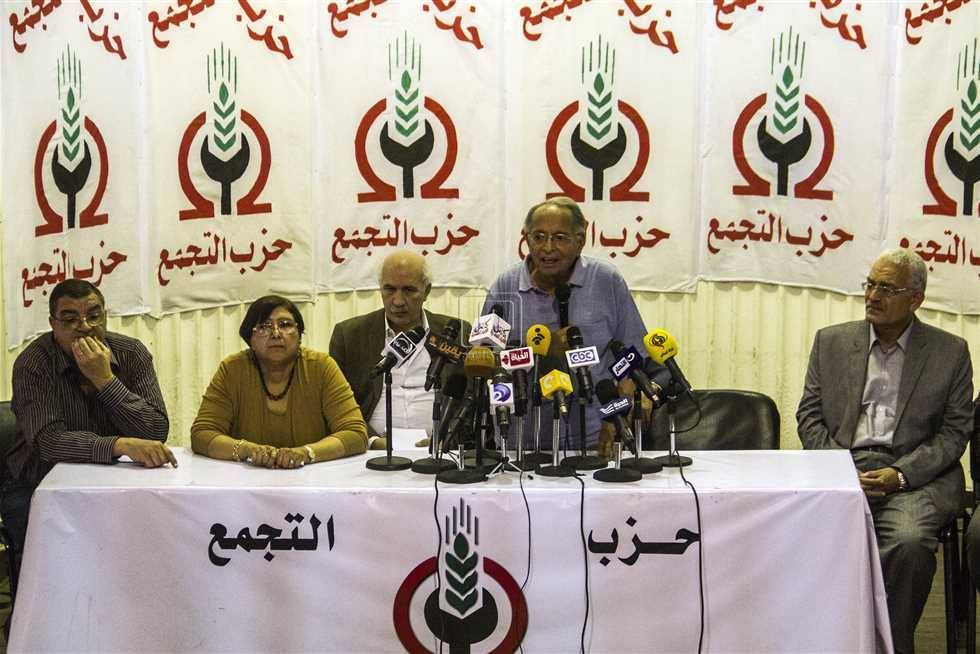
Despite his attack on the parties and their performance, Rabie believes that there are parties trying to engage in important issues to some extent, but also under limits and a ceiling, indicating parties such as the “Egyptian Social Democratic Party”, the “Dignity Party”, and the “National Progressive Unionist Party” (the most famous of Egypt’s leftist parties that is currently headed by a member of the Senate, Sayed Abdel-Aal).
The deputy director of Al-Ahram Center continues to state, “The state is burying the parties. Instead of using the system of proportional (representation) lists in the elections and reviving the presence of these parties in the political arena, it used the absolute list system. This is a very bad thing. Even the Wafd Party has been left with nothing but its name, and all parties are scrambling behind what the authority sees fit and what the security sees fit. These are entities that do not have independent opinions regarding internal or foreign policies.” He goes on to note that the state has only two organized forces: the “security force” and the “bureaucracy.”
As for Representative Ahmed Mehanna, deputy of the Workforce Committee in the House of Representatives, and deputy head of the Freedom Egypt Party (founded in 2011), he believes that despite the large number of parties, the number of parties currently present and active on the scene does not reach ten. He sees that the rest have permanently disappeared and have no role whatsoever in state issues, revealing the “fall” of the dreams of many “politicians” who, after the “January 25” and “June 30” revolutions, had dreamt to be leaders supported by a popular and political backer from parliament or local representatives. Experience has proven that these dreams do not come true out of the blue, and rather have their requirements.
Mehanna tells Raseef22 that the emergence of a political party to the Egyptian scene now requires many elements, such as: financial capabilities, especially since the financial support for the parties stopped following the January 25 revolution. Each party used to receive 100,000 Egyptian pounds (annually) before that revolution, which used to be enough during that period to spend on its headquarters and organize some political activities. It’s an amount that is now equivalent in value to more than half a million Egyptian pounds.
He talks more about the powerful political figures and representatives that are very popular on the Egyptian street, and says that this factor helps the party be more present in the political arena, and to rally the street around it. People always steer towards the strong person and the powerful entity, but the absence of the components for the emergence of parties was the reason for eliminating the majority of the parties whose leaders dreamed of becoming members of the House of Representatives and the Senate, or getting close to the men of power. These are personal goals, objectives, and interests that do not create major political entities.
He continues, “The large number of parties — 104 or 106 — is only found within the documents of the Party Affairs Committee, but on the ground there are only 10 or 12 active parties, and even these parties rank in terms of strength. Some of them are really strong and are actually present — whether among the people or in the House of Representatives and the Senate. Also among them are those that are medium in strength, and then there are other parties whose presence is limited to the statements they issue to interact with the matters taking place in the state, while the rest of the parties have been completely erased from the map.”
Mehanna believes that the presence of parties in Egypt is a “seasonal presence,” meaning that when there are elections, you find that the party has “opened its doors and all the people are running to it.” He says that this is the nature of the Egyptian politician, which reveals that he is not political all the time, but is only political at the time of the event, citing an example over the recent events in Palestine. The events saw some political arties issuing statements of solidarity, organizing seminars, or participating in an aid convoy headed to the Gaza Strip, with Mehanna denying that all Egyptian parties were able to participate in such an event.
Regarding the participation or the role of political parties in major issues surrounding the state — such as the Grand Renaissance Dam — he confirms that there are issues concerning Egyptian national security, where t is not in the public interest to talk about it much. That is why some parties raise the slogan, “It’s better to stay away”. On the other hand, some members of the House of Representatives and the Senate convey the views of their parties to the specialized committees in those councils, or in the “workshops” which represent legitimate outlets.
The deputy head of the “Freedom Egypt Party” says that it is better that political figures not talk about files that they haven’t studied well, especially the Grand Renaissance Dam file, citing the example of former Egyptian President Mohamed Morsi’s meeting with political and party leaders and their talk of the use of force against Ethiopia to solve the Grand Renaissance Dam crisis. In his opinion, this meeting was one of the causes that complicated things and the beginning of crises with all of Africa.
Egyptian President Mohamed Morsi held a national dialogue session with political forces on June 3rd, 2013, to discuss the ramifications of the Ethiopian decision to build the Grand Renaissance Dam. Some opposition forces responded, with political leaders surprised by the broadcasting of the meeting's proceedings live. The Egyptian presidency apologized for what it dubbed the “unintended embarrassment” that resulted from the broadcast, which included some of those present threatening to use force and interfering in Ethiopian affairs, as well as sharp criticism of the Sudanese stance on the issue.
In summary, Mehanna affirms his support for the idea of merging parties that have similar political ideologies so that we have four or five strong parties, provided that the merger comes with certain guarantees, away from the struggle for key positions in these political entities, denying that the political authority is exercising restrictions on parties of the opposition, and stressing that “the state leaves any party operating in the street as long as it does not work against the interests of the state of Egypt.”
On the other hand, former member of Egyptian Parliament and a member of the political office of the opposing “Socialist Popular Alliance Party” Haitham el-Hariri, believes that the parties did not withdraw from participating in the discussion of major issues or presenting their views on them. He says the crisis lies in the presence of marginalization and a restriction of the activity of those parties.
Hariri added to Raseef22 that despite this, there are a limited number of serious parties that have clear and strong positions on major issues such as the Grand Renaissance Dam and are trying to express these stances by issuing statements or organizing seminars. He goes on, “But the problem is that the current political regime sees that the parties should not have a role right now, and therefore there is no political life,” stressing that this situation also applies to the various media outlets that do not present an opinion and other different views, but what is being proposed now is “one opinion and one direction”.
Hariri points out that the Socialist Popular Alliance Party always discusses all major issues, whether through official statements where a position is clearly and explicitly announced, or through webinars that it organizes on its official Facebook page, where it seeks the assistance of experts specialized on these issues. Using the latter method, the party discussed issues of the Grand Renaissance Dam in addition to foreign files such as Libya, recent events in Palestine, the Coronavirus pandemic, issues regarding pension, and “the party always makes recommendations on it views regarding these issues, but the problem is that there is no real intention to create a political life.”
Speaking on the presence of famous figures at the head of the parties — such as Ahmed Tantawi — and the possibility that this would help them have a strong presence in the street, he says, “The presence of these personalities may be just a commendation for these parties in front of the competitors, but at the same time it will not add much to the party itself under the presence of a chained-down political life. With the deteriorating economic conditions, people see that interest in politics is a luxury.”
He adds that the citizens the parties are addressing already have fears or are experiencing a state of intimidation from political action, and the election system, whether in the House of Representatives or the Senate, does not encourage the fittest elements to enter these institutions. Rather, the most fortunate and those that the authority is satisfied with enter, in addition to, “The media does not allow us to present our views, reach citizens, or discuss important issues.”
A member of the political bureau of the Socialist Popular Alliance Party demanded that the regime have a political will to make way for political action, saying, “The regime is strong in the event of a strong political opposition, and vice versa. Before the revolution, there were security interventions in political life, and still are, but they were enforced in a wiser manner during the Mubarak era.”
Regarding the political entities that are sponsored by the authority and that bestow positions and appointments on their members, Hariri said that they are all security choices for personalities that have no influence on the street, and have no real cause, evidenced by the fact that parties that have clear and strong stances — such as the Dignity Party, the Socialist Popular Alliance Party, and the Constitution Party — are not represented in Parliament. He ends with, “There are parties that work in a pragmatic way in order to persist in political life, but we will not work like them.”
Raseef22 is a not for profit entity. Our focus is on quality journalism. Every contribution to the NasRaseef membership goes directly towards journalism production. We stand independent, not accepting corporate sponsorships, sponsored content or political funding.
Support our mission to keep Raseef22 available to all readers by clicking here!
Interested in writing with us? Check our pitch process here!
